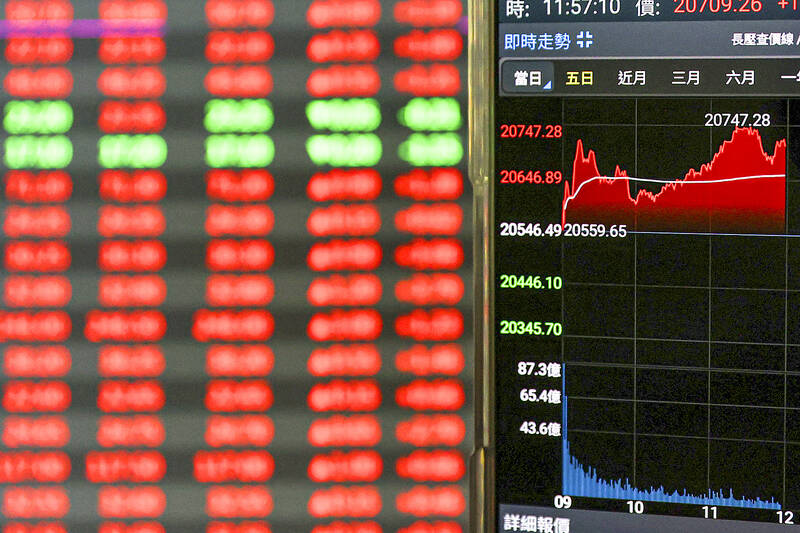Shares in Taiwan yesterday rose as the de-escalation of trade tensions between the US and China provided immediate relief to the nation’s major contract electronics manufacturers, many of which have substantial production capacities in China.
The TAIEX closed up 200.6 points, or 0.95 percent, at 21,330.14, catching up with big advances on Wall Street overnight, where the tech-heavy NASDAQ Composite rose more than 4 percent, the S&P 500 jumped 3.3 percent and the Dow Jones Industrial Average increased 2.8 percent.
“The US-China significant tariff cut was encouraging, so US markets jumped overnight and the Taipei market just followed today,” Mega International Investment Services Corp (兆豐國際投顧) analyst Alex Huang (黃國偉) said.

Photo: CNA
The bellwether electronics sector led the upturn throughout the session, rising 1.17 percent after shares in contract chipmaker Taiwan Semiconductor Manufacturing Co (台積電) rose 1.25 percent to close at NT$969, Huang added.
“The upcoming Computex Taipei prompted investors to pick up artificial intelligence [AI] related tech stocks on hopes of positive leads from the annual tech exhibition,” he said.
Shares of Hon Hai Precision Industry Co (鴻海), a supplier of AI servers and an assembler of Apple Inc’s iPhones, rallied 3.27 percent to NT$158, Taiwan Stock Exchange data showed.
Hon Hai stands to benefit the most from the US-China trade truce as about 75 percent of its production facilities are in China, dealers said.
The company relies heavily on its Chinese production bases despite ongoing diversification efforts. Its facility in Zhengzhou, China, remains the world’s largest iPhone manufacturing site, while the Shenzhen plant is a hub for iPhone research and development and pilot production.
With US-China tariffs reduced to 30 percent and 10 percent from the previous 145 percent and 125 percent respectively, pressure on the Apple supply chain and notebook production lines has been substantially subdued, dealers said.
Other electronics suppliers including Quanta Computer Inc (廣達電腦), Inventec Corp (英業達), Wistron Corp (緯創), Pegatron Corp (和碩) and Compal Electronics Inc (仁寶) also stand to gain from reduced tariff pressures, they added.
Compal’s Chinese factories — in Kunshan, Nanjing, Chongqing and Chengdu — accounted for 70 percent of its total output last year. Quanta has major notebook production sites in Chongqing and Shanghai, while Inventec operates plants in Shanghai, Chongqing and Nanjing, focusing on servers, automotive electronics and laptops.
Pegatron, with about 70 percent of its total production in China, manufactures automotive products and handles some consumer electronics assembly in Suzhou, while Wistron’s Chinese operations account for less than 50 percent of its total output, as the company diversifies globally.
UBS Group said it has preferences in Taiwan’s supply chain compared with their Chinese peers, as firms in the AI supply chain are better off and more insulated from the tariff tensions.
A better tariff outcome would broaden the tech portfolio somewhat with smartphones already discounting a challenging outcome, UBS head of Taiwan research Randy Abrams said in a note.

In Italy’s storied gold-making hubs, jewelers are reworking their designs to trim gold content as they race to blunt the effect of record prices and appeal to shoppers watching their budgets. Gold prices hit a record high on Thursday, surging near US$5,600 an ounce, more than double a year ago as geopolitical concerns and jitters over trade pushed investors toward the safe-haven asset. The rally is putting undue pressure on small artisans as they face mounting demands from customers, including international brands, to produce cheaper items, from signature pieces to wedding rings, according to interviews with four independent jewelers in Italy’s main

Japanese Prime Minister Sanae Takaichi has talked up the benefits of a weaker yen in a campaign speech, adopting a tone at odds with her finance ministry, which has refused to rule out any options to counter excessive foreign exchange volatility. Takaichi later softened her stance, saying she did not have a preference for the yen’s direction. “People say the weak yen is bad right now, but for export industries, it’s a major opportunity,” Takaichi said on Saturday at a rally for Liberal Democratic Party candidate Daishiro Yamagiwa in Kanagawa Prefecture ahead of a snap election on Sunday. “Whether it’s selling food or

CONCERNS: Tech companies investing in AI businesses that purchase their products have raised questions among investors that they are artificially propping up demand Nvidia Corp chief executive officer Jensen Huang (黃仁勳) on Saturday said that the company would be participating in OpenAI’s latest funding round, describing it as potentially “the largest investment we’ve ever made.” “We will invest a great deal of money,” Huang told reporters while visiting Taipei. “I believe in OpenAI. The work that they do is incredible. They’re one of the most consequential companies of our time.” Huang did not say exactly how much Nvidia might contribute, but described the investment as “huge.” “Let Sam announce how much he’s going to raise — it’s for him to decide,” Huang said, referring to OpenAI

The global server market is expected to grow 12.8 percent annually this year, with artificial intelligence (AI) servers projected to account for 16.5 percent, driven by continued investment in AI infrastructure by major cloud service providers (CSPs), market researcher TrendForce Corp (集邦科技) said yesterday. Global AI server shipments this year are expected to increase 28 percent year-on-year to more than 2.7 million units, driven by sustained demand from CSPs and government sovereign cloud projects, TrendForce analyst Frank Kung (龔明德) told the Taipei Times. Demand for GPU-based AI servers, including Nvidia Corp’s GB and Vera Rubin rack systems, is expected to remain high,